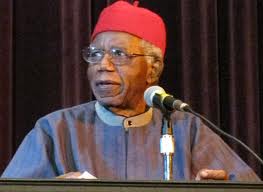Mr. Achebe, 82, died in the United States where he was said to have suffered from an undisclosed ailment.
PREMIUM TIMES learnt he died last night in a hospital in Boston, Massachusetts, United States.
A source close to the family said the professor had been ill for a
while and was hospitalised in an undisclosed hospital in Boston.
The source declined to provide further details, saying the family would issue a statement on the development later today.
Contacted, spokesperson for Brown University, where Mr. Achebe worked
until he took ill, Darlene Trewcrist, is yet to respond to our
enquiries on the professor’s condition.
Until his death, the renowned author of Things Fall Apart was the
David and Marianna Fisher University Professor and Professor of Africana
Studies at Brown.
The University described him as “known the world over for having
played a seminal role in the founding and development of African
literature.”
“Achebe’s global significance lies not only in his talent and
recognition as a writer, but also as a critical thinker and essayist who
has written extensively on questions of the role of culture in Africa
and the social and political significance of aesthetics and analysis of
the postcolonial state in Africa,” Brown University writes of the
literary icon.
Mr. Achebe was the author of Things Fall Apart, published in 1958,
and considered the most widely read book in modern African Literature.
The book sold over 12 million copies and has been translated to over 50
languages worldwide.
Many of his other novels, including Arrow of God, No Longer at Ease,
Anthills of the Savannah, and A man of the People, were equally
influential as well.
Prof Achebe was born in Ogidi, Anambra State, on November 16, 1930
and attended St Philips’ Central School at the age of six. He moved away
from his family to Nekede, four kilometres from Owerri, the capital of
Imo State, at the age of 12 and registered at the Central School there.
He attended Government College Umuahia for his secondary school
education. He was a pioneer student of the University College, now
University of Ibadan in 1948. He was first admitted to study medicine
but changed to English, history and theology after his first year.
While studying at Ibadan, Mr. Achebe began to become critical of
European literature about Africa. He eventually wrote his final papers
in the University in 1953 and emerged with a second-class degree.
Prof Achebe taught for a while after graduation before joining the Nigeria Broadcasting Service in 1954 in Lagos.
While in Lagos with the Broadcast ing Service, Mr. Achebe met
Christie Okoli, who later became his wife; they got married in 1961. The
couple had four children.
He also played a major role during the Nigeria Civil War where he joined the Biafran Government as an ambassador.
His latest book, There Was a Country, was an autobiography
on his experiences and views of the civil war. The book was probably the
most criticised of his writings especially by Nigerians, with many
arguing that the professor did not write a balanced account and wrote
more as a Biafran than as a Nigerian.
Mr. Achebe was a consistent critic of various military dictators that
ruled Nigeria and was a loud voice in denouncing the failure of
governance in the country.
Twice, he rejected offers by the Nigerian government to grant him a
national honour, citing the deplorable political situations in the
country, particularly in his home state of Anambra, as reason.
Below is how Brown University profiled him on its website.
———————————————————————————————————————————-
“Nigerian writer Chinua Achebe is known the world over for having
played a seminal role in the founding and development of African
literature. He continues to be considered among the most significant
world writers. He is most well known for the groundbreaking 1958
novel Things Fall Apart, a novel still considered to be required reading
the world over. It has sold over twelve million copies and has been
translated into more than fifty languages.
“Achebe’s global significance lies not only in his talent and
recognition as a writer, but also as a critical thinker and essayist who
has written extensively on questions of the role of culture in Africa
and the social and political significance of aesthetics and analysis of
the postcolonial state in Africa. He is renowned, for example, for “An
Image of Africa,” his trenchant and famous critique of Joseph
Conrad’s Heart of Darkness. Today, this critique is recognized as one of
the most generative interventions on Conrad; and one that opened the
social study of literary texts, particularly the impact of power
relations on 20th century literary imagination.
“In addition, Achebe is distinguished in his substantial and weighty
investment in the building of literary arts institutions. His work as
the founding editor of the Heinemann African Writers Series led to his
editing over one hundred titles in it. Achebe also edited the University
of Nsukka journal Nsukkascope, founded Okike: A Nigerian Journal of New
Writingand assisted in the founding of a publishing house, Nwamife
Books–an organization responsible for publishing other groundbreaking
work by award-winning writers. He continues his long-standing work on
the development of institutional spaces where writers can be published
and develop creative and intellectual community.”


